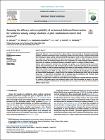| dc.contributor.author | Richards, Derek | |
| dc.contributor.author | Enrique, Angel | |
| dc.contributor.author | Mooney, Olwyn | |
| dc.contributor.author | Salamanca-Sanabria, Alicia | |
| dc.contributor.author | Lee, Chi Tak | |
| dc.contributor.author | Farrell, S. | |
| dc.date.accessioned | 2019-10-02T15:52:03Z | |
| dc.date.available | 2019-10-02T15:52:03Z | |
| dc.date.issued | 2019 | |
| dc.date.submitted | 2019 | en |
| dc.identifier.citation | Enrique, A., Mooney, O., Salamanca-Sanabria, A., Lee, C. T., Farrell, S., & Richards, D., Assessing the efficacy and acceptability of an internet-delivered intervention for resilience among college students: A pilot randomised control trial protocol, Internet Interventions, 17, 2019, 1 - 7 | en |
| dc.identifier.other | Y | |
| dc.identifier.uri | https://www.sciencedirect.com/science/article/pii/S2214782919300648?via%3Dihub#! | |
| dc.identifier.uri | http://hdl.handle.net/2262/89601 | |
| dc.description | PUBLISHED | en |
| dc.description.abstract | Background: Exposure to new stressors places college students at increased risk for developing mental health problems. Preventive interventions aimed at enhancing resilience have the potential to improve mental health and well-being in college students and internet-delivery may improve access to these interventions. However, few studies have evaluated the efficacy of online interventions for resilience in college students. The present study seeks to assess the feasibility [initial efficacy and acceptability] of a newly developed internet-delivered intervention for resilience provided with human or automated support, in a sample of college students.
Method: A pilot randomised controlled trial including three groups: 1) an intervention group with human support; 2) an intervention group with automated support; and 3) a waiting list control group. The intervention, Space for Resilience, is based on positive psychology and consists of seven modules, delivered over a period of eight weeks. Primary outcomes measures will include the Connor-Davidson Resilience Scale (CD-RISC) and the Pemberton Happiness Index (PHI). Secondary outcomes measures will include the Brief Resilience Scale (BRS), the Patient Health Questionnaire – 4 items (PHQ-4), the Rosenberg Self-Esteem Scale (RSES), and the Perceived Stress Scale – 4 items (PSS-4). Acceptability will be examined using the Satisfaction with Treatment (SAT) questionnaire. Analysis will be conducted on an intention-to-treat basis.
Discussion: The study seeks to establish the initial efficacy and acceptability of an internet-delivered intervention for resilience with human support and automated support. Apart from determining the impact of the intervention on acceptability and effectiveness, this study will be a first to explore more clearly the relative benefits of different support modes. | en |
| dc.format.extent | 1 | en |
| dc.format.extent | 7 | en |
| dc.language.iso | en | en |
| dc.relation.ispartofseries | Internet Interventions; | |
| dc.relation.ispartofseries | 17; | |
| dc.rights | Y | en |
| dc.subject | Internet-delivered treatment | en |
| dc.subject | Resilience | en |
| dc.subject | Well-being | en |
| dc.subject | Positive psychology | en |
| dc.subject | Automated support | en |
| dc.subject | Human support | en |
| dc.subject | College students | en |
| dc.title | Assessing the efficacy and acceptability of an internet-delivered intervention for resilience among college students: A pilot randomised control trial protocol | en |
| dc.type | Journal Article | en |
| dc.type.supercollection | scholarly_publications | en |
| dc.type.supercollection | refereed_publications | en |
| dc.identifier.peoplefinderurl | http://people.tcd.ie/drichard | |
| dc.identifier.rssinternalid | 205218 | |
| dc.identifier.doi | doi:10.1016/j.invent.2019.100254 | |
| dc.rights.ecaccessrights | openAccess | |
| dc.subject.TCDTheme | Digital Engagement | en |
| dc.subject.TCDTag | RANDOMISED-CONTROLLED TRIAL | en |
| dc.subject.TCDTag | internet-delivered interventions | en |
| dc.subject.TCDTag | positive psychology | en |
| dc.subject.TCDTag | resilience | en |
| dc.identifier.orcid_id | 0000-0003-0871-4078 | |
| dc.subject.darat_impairment | Mental Health/Psychosocial disability | en |
| dc.status.accessible | N | en |




